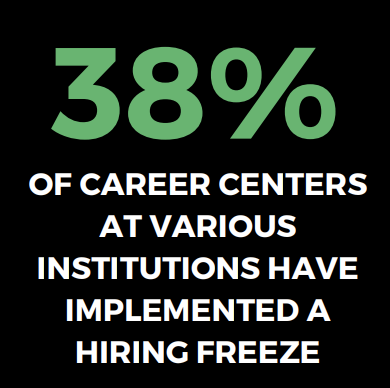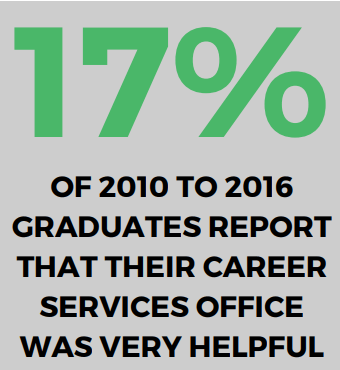7 Ways College Career Service Departments Aren't Serving Students
Who is Failing in Colleges Today?
It's Not Who You Think.
WASHINGTON UNIVERSITY QUAD
It’s no surprise that college admissions have declined during the COVID-19 lockdowns. Now, after over a year of hiatus and online attendance, enrolled students may also be questioning why they are not getting more from their sky-high priced four-year programs. Great curricula, faculties, and prestigious degrees may no longer be enough to entice top, motivated students who learned valuable lessons during this transformative past year.
One reason for growing dissatisfaction may be because students (and recent grads and alumni) are discovering that colleges are frequently failing them in a significant way. In 2021, after a year in which everything about their lives was just disrupted, many find their college career service offices are still offering 20th century resources for a 21st century job market.
It’s time to disrupt Career Services too.
ESTIMATED NATIONAL ENROLLMENT BY INSTITUTIONAL SECTOR: 2019 - 2021
Career Services Need To Improve Their A Game
As an experienced career coach, parent, and university grad myself, I have experienced firsthand how many schools offer outdated and/or undervalued career service tools and resources, doing a disservice to their students, alumni, and ultimately, their community as a whole.
A few schools do hit the mark with outstanding CS programs and are good examples of strategic, real-world thinking, schools like:
Emerson (my alma mater)
Three points of distinction I see in these programs:
Vertical, category experts for specialized career tracks
Commitment to employer engagement and robust, easy access programs for student connections
Welcoming, accessible environments with multiple points of access to meet clients/students where they are
But far more colleges and universities lack the commitment to this critical offering and haven’t evolved or changed them in decades.
One reason for that: Career Services departments are generally the neglected siblings of curriculum, extracurriculars, and other programs. While CS has the power to help educators differentiate and draw great students in - as well as continue to cultivate a strong alumni commitment to the institution and its community after graduation - many administrators and teachers fail to fully see its importance. Career Services may be the last place many college administrators may be considering when they strategize about how to attract top students.
Students, however, know colleges and universities can – and need to – do better. As Andy Chan (VP for Innovation & Career Development, Wake Forest University) said so eloquently in a recent talk, “There is a perennial, pervasive student and alumni dissatisfaction with the university’s support for their career and life preparation, and the internship and job search process.” As a preeminent leader in this area, that says a lot.
GALLUP: GREAT JOBS. GREAT LIVES.
WHERE DOES CAREER SERVICES
START?
Our students and young adults learn exceptional critical thinking, writing, and other valuable skills at higher-level institutions, but not pragmatic thinking about career fields, employment trends, and where they may fit into the big picture. Most importantly, they do not leave with basic tactics and skills they need to communicate their own unique professional value in order to successfully launch their careers.
While the problem is obvious, the good news is that the solution to the problem is not difficult, and tools are readily available. It simply requires a more results focused, 21st-century approach that will help them help more students transition effectively into fulfilling roles in the job market.
SHIFTING FOCUS: EXAMPLES OF
WHERE CAREER SERVICES AT
UNIVERSITIES NEED TO MAKE
CHANGE
Here are eight important ways CS can shift focus from traditional practices into a real-world, supply-and-demand mindset.
1. Students Aren’t One-Size-All. Focus on a Coaching Mindset
Top sports coaches look for ways how to help each athlete develop the skills and mindset they uniquely need to improve and succeed. As a career coach, I approach my clients this same way: no two are alike. Unfortunately, many CS programs are still locked into one-size-fits-all solutions. By adopting a coaching approach, CS departments can start to implement practices that adapt to provide each individual with the unique tools and resources they need to succeed.
2. Go Beyond the Major Focus on Discovery
The best question CS can lead with is “who are you?” Too often though, CS programs don’t consider who students are in the world as individuals, what they want to do, what matters to them, and what they do best. It’s not enough to point to a direction based on a major. CS needs to start with discovery, as well as encouraging each student to truly “know thyself” and be able to articulate their individual strengths and goals clearly.
3.Descend from the Ivory Tower. Focus on Accessibility.
Unfortunately, CS has earned a reputation among students for being inaccessible and unresponsive. A huge contributing factor is that most CS departments are understaffed and underfunded, and can barely manage the workflow they have now. To support a more successful, results- focused approach – as well as the higher engagement among students that would produce - CS departments must be a higher administrative priority, and given the attention, staff, and resources they deserve.
4. Delegate, Focus on Tools
As a complement to personalized services, apps like Handshake can do much to bridge the opportunity gap. This is particularly critical at larger schools where career centers need to both scale services directly to large student populations as well as maintain equally robust employer engagement. While many schools already invest in Handshake and other platforms and services, there needs to be more focus on making sure students are adopting and utilizing them to their full potential.
5. Never Assume. Focus on the Basics:
Many students need help on a real-world foundational level - i.e. how to write introductory or thank-you emails, how to get and conduct informational interviews, and how to answer the question “tell me about yourself.” This is a huge missing piece and missed opportunity for too many schools and CS departments. It’s time to treat the understanding of professional best practices as a curriculum, whether through courses, special programs, or individual coaching.
6. It’s Not About an Updated Resume. Focus on Marketing:
CS programs rarely train students to market themselves. Many students fail in their career searches because they do not understand the importance of communicating how their skills are relevant to the employer’s needs. To better equip students for the workforce, CS departments should coach students in how to present not only what sets them apart from other candidates, but also how they are a good fit for a job, an employer, and an organizational culture-in person, not just on paper.
7. Eliminate the Guesswork. Focus on Tracking ROI and Great Outcomes
Most CS departments lack 21st data tools for tracking their actual success rates. One notable exception is at schools with coop programs, where in-person work experience is part of the core curriculum. Without effective data it’s impossible to know how well – or if – a CS department is serving student needs. With the right measurement tools, departments can be more agile to identify specific goals and adopt best practices for what works for students. Career Search is a real-world endeavor - in its essence a flexible, goal-focused process where pragmatic, real-market principles apply. There is a tremendous opportunity for universities and colleges to update their offerings and truly support young professionals transitioning from the academic world to the workforce.
How to Make Career Services Accessible, Individualized, and Seamless
Many students report not being able to make CS office hours (in-person and virtual) because of busy courses and workloads, and getting lost in complicated computer sites and stacks of analog reference materials when they finally get there. CS should meet students where they are.
This includes:
Updating and streamlining online offerings and resources so that they are intuitive,
content-rich, and always available
Some innovative schools, most notably Stanford, have created enjoyable and
enticing course offerings that teach skills and strategies students will need to
move forward in their careers, something even more viable when offered online
CS classes could be offered – and even differentiated based on a student’s major –
for course credit. For some departments, it may make sense to collaborate with CS
to embed that practical knowledge in existing department curricula.
Introduce students to - and explain how to maximize the value of - platforms like
Handshake to compliment your resources and offerings
Most importantly: in a rapidly changing world, CS needs to be flexible and adaptable to not just help students from the perspective of who they are and where they are -- but also the perspective of current job markets, economies, and global and disruptive trends. That means educators should be working with CS teams to ensure that their programs are cutting edge and up-to-date each school year.
Students, recent graduates, and alumni are facing job markets where disruption, innovation, and adaptation are the new normal. College and university admissions and academic departments will need to adapt to these changing conditions as they face increased competition for - and more demanding requirements from - top applicants and students in the future. A new, innovative, and enhanced focus on CS has the potential to be a key solution for all.





